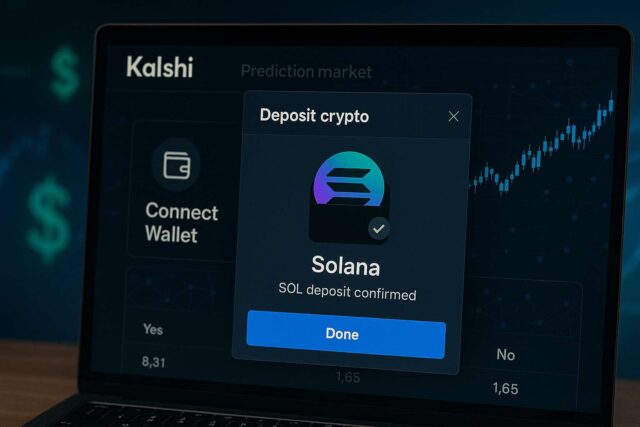Kalshi, a CFTC-regulated prediction market, has expanded its crypto deposits offering by enabling Solana (SOL) as a funding method. This move positions Kalshi more competitively within the increasingly crypto-savvy space, marking a deliberate shift toward capturing the attention of blockchain-native users and staking a claim alongside decentralized platforms like Polymarket.
The integration of Solana is not Kalshi’s first foray into digital assets. The platform had previously enabled deposits via Bitcoin and USDC, making this the third cryptocurrency now supported. All digital asset transactions are processed through Zero Hash, a crypto infrastructure provider that handles custody, conversion, and compliance on behalf of Kalshi. This partnership ensures that while deposits are crypto-based, all trading remains settled in U.S. dollars, in line with Kalshi’s regulatory obligations.
Fast, Cost-Efficient Funding for Prediction Markets
The choice of Solana is rooted in its technological strengths. Solana offers low transaction fees and near-instant confirmation times, features that improve the deposit experience for users. By integrating Solana, Kalshi aims to streamline onboarding for crypto-native users who are accustomed to fast, inexpensive blockchain operations.
Unlike Bitcoin, which often suffers from higher fees and slower processing times, Solana can offer confirmation in seconds at a fraction of a cent per transaction. This is especially appealing for traders operating on prediction markets, where timing and cost-efficiency can impact participation. The new feature enables direct wallet funding, enhancing ease of access for crypto users.
Competing with Polymarket and Decentralized Alternatives
The addition of Solana also places Kalshi in more direct competition with Polymarket, a popular decentralized prediction platform that already accepts various cryptocurrencies. While Polymarket operates in a regulatory gray zone due to its decentralized nature, Kalshi’s CFTC-regulated status appeals to users seeking legal clarity and consumer protections. With the crypto market maturing, Kalshi’s hybrid model, combining regulated infrastructure with blockchain-based funding, is emerging as a compelling middle ground.
The move to support Solana is likely to attract users looking for an alternative to centralized exchanges or unregulated platforms. By offering a compliant way to participate in prediction markets using crypto, Kalshi differentiates itself in a crowded field.
Broader Implications for Solana and Kalshi
For the Solana ecosystem, this integration is another signal of institutional interest. Integrations like Kalshi’s could increase Solana’s liquidity and transactional utility, pushing the asset further into mainstream adoption. Solana’s growing footprint in finance, spanning DeFi, NFT infrastructure, and now regulated prediction markets, strengthens its position as more than just a fast Layer 1 chain.
For Kalshi, the adoption of Solana may set a precedent for further crypto integration. With the infrastructure provided by Zero Hash, the platform is well-positioned to expand its crypto offerings while maintaining compliance. This could unlock new user demographics and help Kalshi stay relevant as crypto-finance hybrids become more common.
>>> Read more: Taurus Expands to Solana With Asset Tokenization Solutions
Kalshi’s integration of Solana deposits marks more than a simple expansion of funding options. It reflects a broader trend toward blending regulated finance with blockchain accessibility. As more users demand faster, cheaper, and crypto-friendly services in financial platforms, Kalshi’s strategic alignment with Solana and Zero Hash gives it a competitive edge in the prediction market space. This evolution not only benefits traders but also reinforces Solana’s growing importance in the financial applications of blockchain technology.
Readers’ frequently asked questions
How do I deposit Solana on Kalshi?
To deposit Solana (SOL) on Kalshi, users must connect a wallet and initiate a transfer to a Kalshi-provided address. The deposit is processed through Zero Hash, which converts the crypto to U.S. dollars for trading on the platform.
Is Kalshi a regulated prediction market?
Yes. Kalshi is regulated by the U.S. Commodity Futures Trading Commission (CFTC), which oversees its prediction market offerings and ensures compliance with financial regulations.
Why did Kalshi choose Solana over other cryptos?
Kalshi added Solana because of its fast transaction speeds and minimal fees. These features improve the user experience compared to older networks like Bitcoin, making Solana ideal for efficient deposit processing.
What Is In It For You? Action Items You Might Want to Consider
Take advantage of Solana’s speed
If you’re already active in the crypto space, using SOL to fund your Kalshi account can get you into the market faster, with fewer delays and lower costs.
Explore Kalshi’s hybrid model
Use this opportunity to test how a regulated platform integrates crypto funding while maintaining dollar-denominated markets. It may offer the best of both worlds.
Monitor Solana’s institutional use cases
Kalshi’s support for SOL adds another brick in Solana’s adoption story. Traders may want to track how such integrations affect SOL’s liquidity and valuation.










